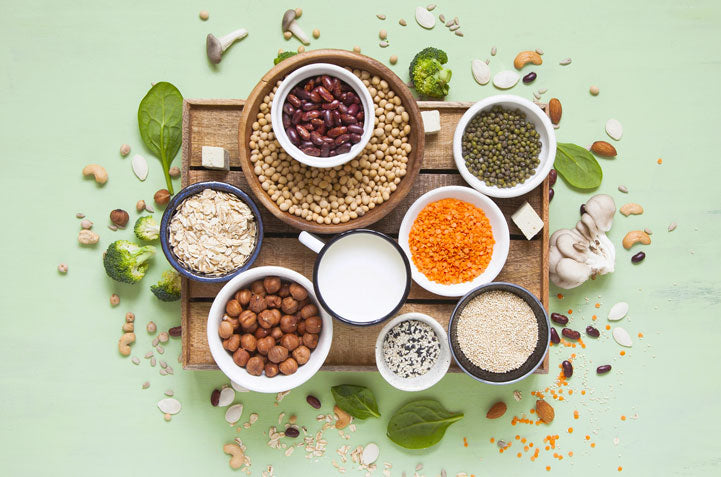With the rising awareness about the impact of our food choices on both our health and the environment, plant-based proteins have gained significant attention in recent years. These protein sources are derived from plants such as legumes, nuts, seeds, and grains, and offer a wide range of benefits compared to their animal-based counterparts. In this comprehensive guide, we will delve into the various types of plant-based proteins, their nutritional profiles, and how they compare to animal-based proteins. So let’s dive into the world of plant-based proteins and discover why they are becoming increasingly popular.
Benefits of Plant-Based Proteins

Before we explore the different types of plant-based proteins, it is essential to understand why incorporating them into our diets can be beneficial. Here are some compelling reasons:
Environmental Sustainability
Plant-based proteins have a significantly lower environmental impact compared to animal-based proteins. Animal agriculture is responsible for approximately 14.5% of global greenhouse gas emissions, primarily through methane production from livestock [1]. By replacing animal-based proteins with plant-based alternatives, we can reduce our carbon footprint and contribute to mitigating the effects of climate change.
Moreover, producing animal products requires a significant amount of water for livestock feed and drinking. For instance, it takes approximately 1,800 gallons of water to produce just one pound of beef [2]. On the other hand, plant-based proteins, especially legumes, have a much smaller water footprint, making them a more sustainable choice for our planet.
Health Benefits
Plant-based proteins offer a host of health benefits, making them a compelling option for individuals looking to improve their overall well-being. Studies have shown that consuming a predominantly plant-based diet can lower the risk of chronic diseases such as heart disease, diabetes, and certain cancers [3].
Additionally, plant-based proteins are typically lower in calories and saturated fats compared to animal-based proteins, making them a healthier choice for those looking to manage their weight and cholesterol levels. They are also rich in fiber, vitamins, minerals, and antioxidants, which are essential for optimal health.
Ethical Considerations
Many people choose to follow a plant-based diet due to ethical considerations towards animal welfare. By choosing plant-based proteins, individuals can reduce their contribution to the suffering of animals in the food industry. This aspect may not directly affect personal health or the environment, but it is a crucial factor for many people’s dietary choices.
Types of Plant-Based Proteins

There is a wide range of plant-based protein sources available, each with its unique nutritional profile and health benefits. Here are some of the most popular types of plant-based proteins:
Legumes
Legumes are plants that belong to the bean family and include varieties such as lentils, peas, chickpeas, and beans. They are an excellent source of plant-based protein, with one cup of cooked lentils containing approximately 18 grams of protein [4]. Moreover, legumes are also rich in fiber, iron, folate, and other essential minerals, making them a nutritious addition to any diet.
Furthermore, legumes are versatile and can be used in various dishes, from soups and stews to salads and curries. They are also a cost-effective protein source, making them a more accessible option for individuals on a budget.
Nuts and Seeds
Nuts and seeds are another excellent source of plant-based protein and offer a wide range of health benefits. For instance, one ounce of almonds contains 6 grams of protein, while one tablespoon of chia seeds contains 2 grams of protein [5] [6]. They also provide healthy fats, fiber, and various vitamins and minerals.
Moreover, nuts and seeds are incredibly versatile and can be consumed as snacks, added to salads, or used in baking and cooking. They are also a good source of omega-3 fatty acids, which are essential for heart health.
Grains
Whole grains such as quinoa, oats, and brown rice are often overlooked as a protein source. However, they can provide a significant amount of plant-based protein when consumed in their whole form. For instance, one cup of cooked quinoa contains approximately 8 grams of protein [7].
Whole grains are also rich in fiber, vitamins, and minerals, making them a healthy addition to any diet. Moreover, they can be used in various dishes, from breakfast porridge to salads and side dishes.
Soy Products
Soy is a complete protein source, meaning it provides all nine essential amino acids that our bodies cannot produce on their own. This makes soy products such as tofu, tempeh, and edamame an excellent option for individuals looking to increase their protein intake.
Moreover, soy products are also rich in iron, calcium, and other essential minerals. They can be used in a variety of dishes, from stir-fries to sandwiches and smoothies.
Plant-Based Protein Powders
Plant-based protein powders have gained popularity in recent years as a convenient way to boost protein intake. These powders are typically made from pea, hemp, or rice protein and offer a quick and easy way to add protein to shakes, smoothies, and baked goods.
While plant-based protein powders can be a useful supplement for those struggling to meet their protein needs through whole foods, it is crucial to choose high-quality, minimally processed options without added sugars and artificial ingredients.
Comparison with Animal-Based Proteins
Now that we have explored the various types of plant-based proteins let’s compare their nutritional profiles to animal-based proteins:
| Nutrient | Plant-Based Protein | Animal-Based Protein |
|---|---|---|
| Protein | Varies depending on type | Varies depending on type |
| Fiber | High | Low |
| Saturated Fats | Low | High |
| Cholesterol | Absent | Present |
| Iron | Varies depending on type | High |
| Calcium | Varies depending on type | High |
| Vitamin B12 | Absent | Present |
As shown in the table, plant-based proteins are generally higher in fiber, lower in saturated fats, and absent of cholesterol compared to animal-based proteins. However, animal-based proteins are typically higher in iron and calcium, making them a valuable source for individuals with specific dietary needs. It is essential to note that these comparisons are general, and the nutritional profiles may vary depending on the specific types of plant-based and animal-based proteins consumed.
In conclusion, plant-based proteins offer a wide range of benefits, making them a compelling choice for individuals looking to improve their health and reduce their impact on the environment. With various options such as legumes, nuts, seeds, grains, soy products, and protein powders, it is possible to meet our protein needs without consuming animal products. However, it is crucial to pay attention to the quality and variety of plant-based proteins consumed to ensure a well-rounded and nutritious diet.
Whether you choose to follow a fully plant-based diet or simply incorporate more plant-based protein sources into your meals, these alternatives can provide a host of essential nutrients and contribute to a healthier and more sustainable lifestyle. So why not give some of these plant-based proteins a try and see how they can benefit you?
